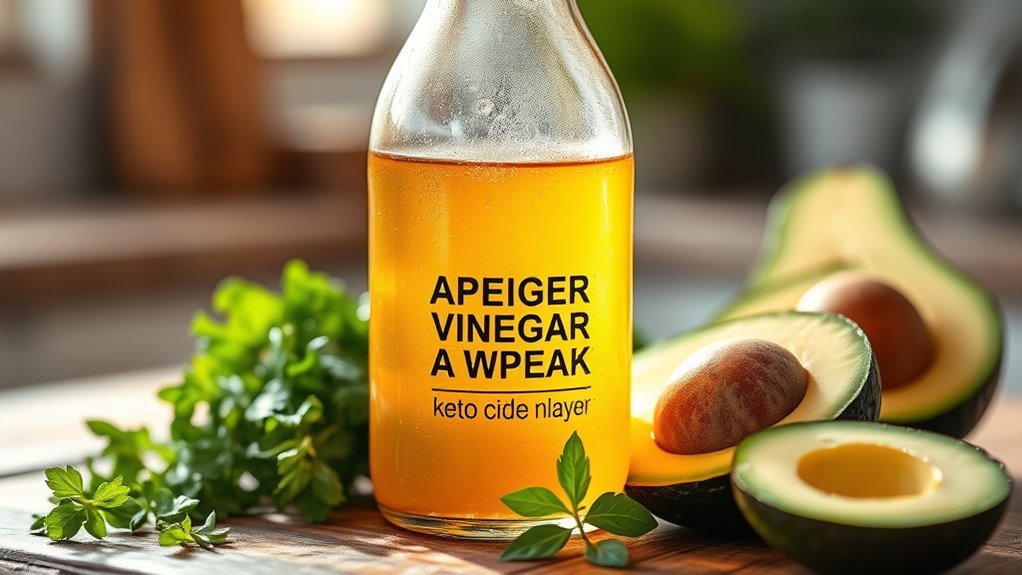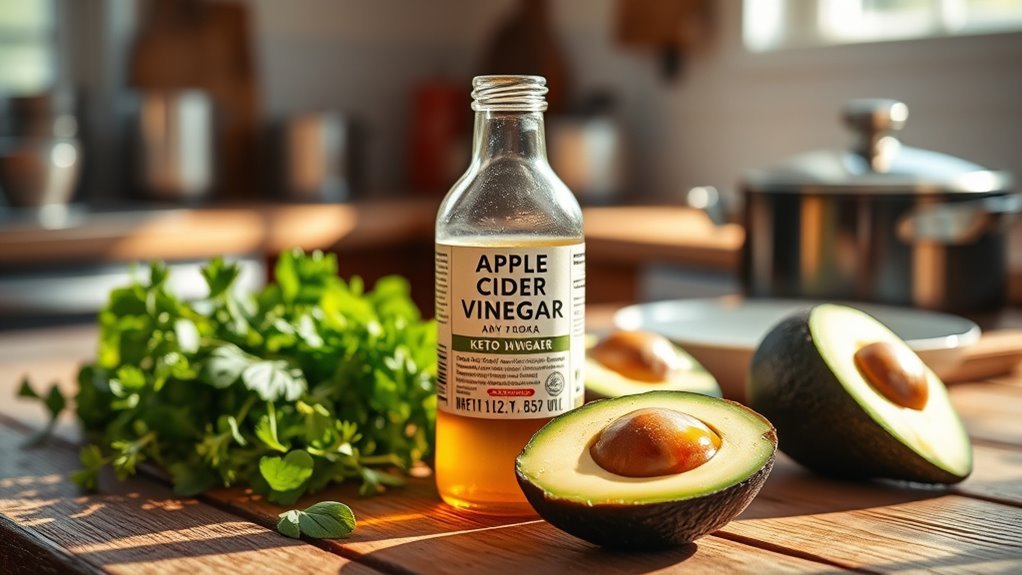Yes, vinegar is keto-friendly! It mainly consists of acetic acid and water, with minimal carbohydrates, making it suitable for a low-carb diet. Apple cider vinegar is particularly popular for its health benefits, including improved insulin sensitivity and appetite suppression. However, be cautious with types like balsamic vinegar, which have higher sugar content. Using vinegar can enhance your meals while supporting your keto journey. If you’re curious about how to incorporate it into your diet effectively, there’s more to discover!
Understanding the Nutritional Profile of Vinegar

When you’re considering whether vinegar fits into a keto diet, it’s important to first understand its nutritional profile. Vinegar primarily consists of acetic acid, water, and trace amounts of other compounds. Due to its minimal carbohydrate content, it’s often seen as keto-friendly. The vinegar chemistry indicates that acetic acid may support weight loss and improve insulin sensitivity, both beneficial for those following a low-carb lifestyle. Additionally, vinegar offers health benefits like enhanced digestion and potential antimicrobial properties. However, it’s essential to choose varieties without added sugars or preservatives to maintain alignment with your keto goals. Overall, incorporating vinegar into your diet can be a flavorful and health-conscious choice, enhancing your culinary freedom while adhering to keto principles.
Types of Vinegar and Their Keto Compatibility

When considering your keto diet, it’s important to look at the types of vinegar you use. Apple cider vinegar is often praised for its potential health benefits, while balsamic vinegar may have higher sugar content that could impact your carb intake. Understanding these differences can help you make informed choices that align with your keto goals.
Apple Cider Vinegar Benefits
Although vinegar often gets overlooked, apple cider vinegar (ACV) offers several benefits that can complement a keto lifestyle. One of the most notable vinegar uses is its potential to aid in weight management. Studies suggest that apple cider can enhance feelings of fullness, which may help you consume fewer calories. Additionally, it may help regulate blood sugar levels, making it easier to maintain energy without spikes. The acetic acid in ACV also has antimicrobial properties, potentially benefiting gut health. You can easily incorporate it into your diet—add it to salad dressings, marinades, or dilute it in water. Embracing apple cider vinegar can be a simple yet effective way to support your keto journey while enjoying the freedom of flavorful choices.
Balsamic Vinegar Considerations
While balsamic vinegar can add a rich flavor to your dishes, it’s important to take into account its carbohydrate content when following a keto diet. With a higher sugar content compared to other vinegars, balsamic vinegar can contribute to your daily carb limit, especially if you use it in larger amounts. Its calorie content is also worth noting, as it can add up quickly in salad dressings and cooking applications. If you love the flavor profile of balsamic, consider keto-friendly alternatives like apple cider vinegar or red wine vinegar, which are lower in sugar. Practicing portion control is essential, so keep servings small to enjoy the taste without compromising your keto goals.
How Vinegar Affects Blood Sugar and Insulin Levels

Vinegar has been shown to play a role in blood sugar regulation, making it a potential ally for those managing their insulin levels. Research suggests that vinegar can improve insulin sensitivity and reduce the glycemic response after meals. By incorporating vinegar into your diet, you may find it easier to maintain stable blood sugar levels.
Blood Sugar Regulation
When it comes to managing blood sugar levels, incorporating vinegar into your diet might offer some surprising benefits. Research shows that vinegar can help mitigate blood sugar spikes and improve your insulin response. Here are three ways it can make a difference:
- Stabilizes blood sugar: Adding vinegar to meals can lower post-meal blood sugar levels.
- Reduces insulin spikes: It may help decrease the amount of insulin your body needs after eating.
- Enhances satiety: Vinegar can increase feelings of fullness, which may lead to lower overall food intake.
Insulin Sensitivity Improvement
Incorporating vinegar into your meals may not only help stabilize blood sugar but also enhance insulin sensitivity. Research shows that vinegar can improve your insulin response after meals, which is essential for maintaining metabolic health. By reducing the amount of insulin your body needs to produce, vinegar may support better glucose uptake by your cells, leading to a more balanced blood sugar level. This improvement in insulin sensitivity can be especially beneficial for those on a keto diet, as it promotes fat utilization for energy rather than relying on glucose. Including vinegar in your diet can empower you to take control of your metabolic health while enjoying flavorful dishes. It’s a simple, effective step toward better overall wellness.
Glycemic Response Reduction
While many are seeking ways to manage their blood sugar levels, research suggests that vinegar can play a significant role in reducing glycemic response. By incorporating vinegar into your meals, you may experience several benefits related to blood sugar control:
- Lower Glycemic Index: Vinegar properties can help lower the glycemic index of carbohydrates, leading to more stable blood sugar levels.
- Reduced Insulin Spikes: Your body might produce less insulin after meals, which can help maintain energy levels and reduce cravings.
- Improved Satiety: Vinegar can increase feelings of fullness, potentially aiding in weight management—an important aspect of blood sugar control.
Embracing vinegar in your diet could empower you to take charge of your health and enjoy greater freedom in your food choices.
The Role of Vinegar in Appetite Control
Although appetite control is a crucial aspect of any weight management strategy, the inclusion of vinegar in your diet may offer some surprising benefits. Research suggests that vinegar can promote appetite suppression, helping you feel fuller for longer. This effect is largely attributed to its acetic acid content, which may play a role in hunger regulation by influencing hormones that control appetite. By stabilizing blood sugar levels, vinegar can also prevent those pesky cravings that often derail your efforts. Incorporating vinegar into your meals might provide you with a sense of freedom from constant snacking or overeating. However, it’s important to remember that vinegar isn’t a magic solution; a balanced diet and healthy lifestyle are key to effective appetite control.
Incorporating Vinegar Into Your Keto Diet
Vinegar can easily find its place in a keto diet, thanks to its low carbohydrate content and potential health benefits. You can elevate your meals and embrace the freedom of a flavorful lifestyle by incorporating vinegar in various ways. Here are three ideas to inspire you:
Incorporate vinegar into your keto meals for flavor and health benefits while keeping carbs in check.
- Keto Dressings: Whip up vinaigrettes using olive oil and vinegar for salads or roasted veggies.
- Marinades: Use vinegar in marinades for meats, enhancing flavor without adding carbs.
- Pickling: Create quick pickles with cucumbers and vinegar, adding a crunchy, tangy side to your meals.
These vinegar recipes not only keep your carb count low but also add zest to your dishes, making your keto journey enjoyable and satisfying.
Potential Health Benefits of Vinegar on a Keto Diet
When you’re following a keto diet, adding vinegar can offer several health benefits that complement your low-carb lifestyle. Research suggests that vinegar aids in digestion, helping your body break down food more efficiently. This can be especially beneficial on a keto diet, where changes in diet can sometimes lead to digestive discomfort. Additionally, vinegar is known for its detoxification properties; it may assist your liver in eliminating toxins while promoting overall gut health. Incorporating vinegar into your meals can also help stabilize blood sugar levels, making it easier to maintain your energy and curb cravings. By embracing vinegar, you’re not just enhancing flavor, but potentially boosting your health and well-being on your keto journey.
Common Misconceptions About Vinegar and Ketosis
How can something as simple as vinegar spark confusion when it comes to ketosis? Many believe vinegar can magically accelerate fat loss or push you into ketosis quicker, but these are just vinegar myths. Understanding the facts is essential for your keto journey. Here are three key misconceptions:
- Vinegar alone can induce ketosis – It doesn’t replace proper dietary adjustments.
- All vinegars are created equal – Not all types support your health goals; choose wisely.
- Vinegar is a weight-loss miracle – While it may aid digestion, it won’t make up for poor food choices.
Frequently Asked Questions
Can Vinegar Help With Weight Loss on a Keto Diet?
Vinegar can support weight loss on a keto diet, thanks to its vinegar benefits. Studies suggest that vinegar may help control appetite and improve metabolic rates, making it easier for you to stick to your low-carb lifestyle. Just incorporating a small amount into your meals could enhance feelings of fullness. However, remember that it’s not a magic solution; combining vinegar with a balanced diet and exercise is key to achieving your goals.
Is Apple Cider Vinegar Better Than Other Vinegars for Keto?
Apple cider vinegar can offer some unique benefits for those on a keto diet, but it’s not necessarily better than other vinegars. It may help regulate blood sugar levels and promote feelings of fullness, which are beneficial for weight loss. However, other vinegars like red wine or balsamic also have their own health benefits. Ultimately, it’s about what fits your taste and dietary preferences while enjoying the freedom of variety in your meals.
How Much Vinegar Should I Consume Daily on Keto?
You should aim for about 1 to 2 tablespoons of vinegar daily on a keto diet. This vinegar dosage can help with digestion and may aid in blood sugar control. However, it’s essential to monitor your daily intake, as too much can lead to digestive issues. Consider diluting it in water to minimize acidity. Always listen to your body, and adjust according to how you feel while incorporating vinegar into your routine.
Are There Any Side Effects of Vinegar on a Keto Diet?
While vinegar’s often seen as a magic potion for health, it can have side effects, especially on a keto diet. You might experience digestive issues like stomach upset or heartburn if you consume too much. Though vinegar benefits include improved digestion and blood sugar control, moderation is key. Keep your intake balanced to enjoy the perks without the pitfalls. Always listen to your body; it knows best what works for you.
Can Vinegar Be Used in Keto-Friendly Recipes?
Absolutely, you can use vinegar in keto-friendly recipes! It’s a great addition to keto salads, enhancing flavors without adding carbs. Vinegar marinades are especially useful for marinating meats or veggies, providing a tangy taste while keeping your meals low-carb. Just be mindful of portion sizes, as some flavored vinegars can contain sugars. Overall, vinegar can enrich your keto dishes while helping you maintain that desired freedom in your meal choices.
Is vinegar keto-friendly?
Yes, vinegar is generally considered keto-friendly. Most types of vinegar, such as apple cider vinegar, white vinegar, and balsamic vinegar, are low in carbohydrates and can fit into a ketogenic diet. They can also add flavor to your meals without significantly increasing your carb intake.
What types of vinegar are best for a keto diet?
The best types of vinegar for a keto diet include apple cider vinegar, white vinegar, red wine vinegar, and rice vinegar. These options are low in carbs and calories. Balsamic vinegar should be used with caution as it can contain higher sugar content, so checking the nutritional label is recommended.
Can vinegar help with weight loss on a keto diet?
Vinegar, particularly apple cider vinegar, is often touted for its potential benefits in weight loss. Some studies suggest that vinegar may help to increase feelings of fullness and reduce overall calorie intake. However, while it can complement a keto diet, it should not be relied upon as a sole weight loss strategy.
How can I incorporate vinegar into my keto meals?
You can incorporate vinegar into your keto meals by using it as a salad dressing, marinade, or seasoning. For example, combine olive oil with vinegar for a simple dressing, or use it to marinate meats and vegetables. It can also be added to sauces or used to enhance the flavor of soups and stews.
Are there any side effects of consuming vinegar on a keto diet?
While vinegar is safe for most people when consumed in moderation, excessive intake can lead to digestive issues such as upset stomach or acid reflux. Additionally, individuals with certain health conditions or those taking medications should consult with a healthcare professional before adding large amounts of vinegar to their diet.
References
- https://www.healthline.com/nutrition/apple-cider-vinegar-keto
- https://www.ncbi.nlm.nih.gov/pmc/articles/PMC4045114/
- https://www.medicalnewstoday.com/articles/323493
- https://www.clevelandclinic.org/health/diseases/21708-vinegar-and-health
- https://www.webmd.com/diet/what-is-the-keto-diet
- https://www.health.harvard.edu/staying-healthy/understanding-the-ketogenic-diet


